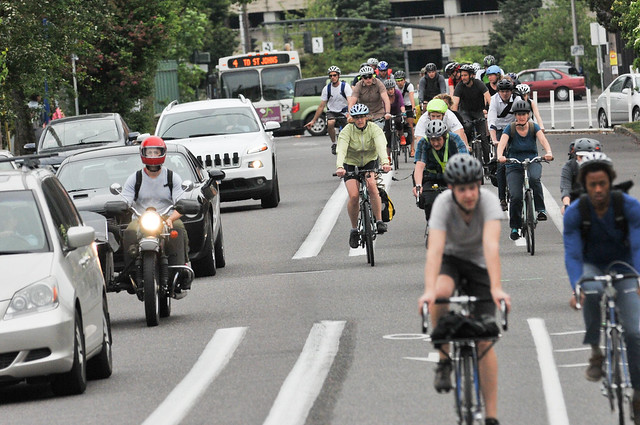
(Photos: J.Maus/BikePortland unless noted)
Last month, we wrote about the 38,501 additional cars and trucks that would be in Multnomah County right now if its residents still owned cars at the rate they did in 2007.
What does it cost to own 38,501 cars? Or more to the point, what does it not cost to not own them?
For that post, we focused on the amount of space those nonexistent cars would take up. They’d fill a parking lot almost exactly the size of the central business district, for example.
But what about the money that isn’t being spent to move, maintain, insure and replace all those cars, and can therefore be spent on other things? How much money have Portlanders collectively saved by having a city where car ownership (or ownership of one car for each adult) feels less mandatory than it used to?
Because we already tackled parking space to some extent, let’s not even try to estimate its costs, even though occupying the most precious real estate in the state (maybe you’ve noticed that space has been getting more expensive?) is one of the biggest social costs of car ownership in Portland. For simplicity’s sake, let’s focus entirely in this post on the cost of owning and operating the cars that never showed up.
As we wrote last month, Multnomah County auto registrations per resident are down 7 percent since 2007, a rate that has barely rebounded despite a strong local economy that’s seen rising real wages, even though the rates in neighboring Washington and Clackamas counties are pretty much back to their long-term averages.
What’s more (as a couple people pointed out in the comments to the previous piece) as of 2014 Portland-area residents are also driving about 8 percent less than they did in 2007, even though other Americans aren’t:
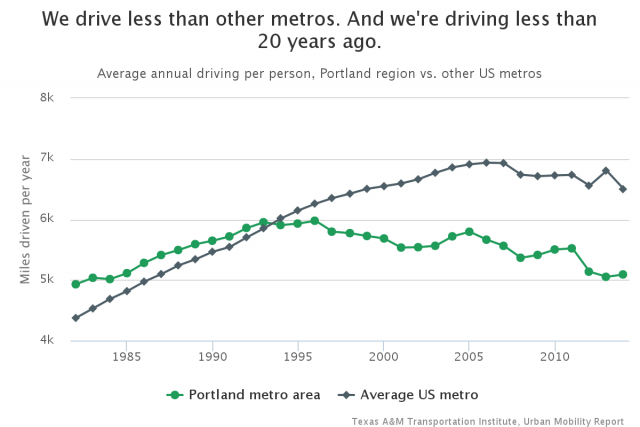
So what does it cost to own 38,501 cars?
Or more to the point, what does it not cost to not own them?
The widely cited American Auto Association cost estimate for car ownership is $8,558 in 2016 for an “average” sedan driven 15,000 miles per year. That figure doesn’t include parking (the cost of owning a property with a driveway or garage, for example) or the health costs of spending too much time in a car. But on direct costs it’s inflated, because it assumes you buy a new car every five years, buy top-quality insurance, drive it through five typical U.S. winters, and then trade it in. Most Americans don’t buy new cars constantly or top-quality insurance. And Portland winters don’t kill cars that fast.
So to be conservative, let’s cut AAA’s insurance cost estimate by 25 percent, to $917 per year. And let’s reduce its depreciation and financing by 75 percent, to just $1,111 per year. (This assumes that if you saved $93 every month, you could afford to buy a car with cash by the time the old one died.) And because auto registration fees in Oregon are very low and there’s no sales tax, let’s estimate $150 a year for registration, title fees and emission inspections rather than AAA’s $683 average.
That comes to:
$917 for insurance
+
$1,111 for purchase
+
$150 for taxes and fees
=
$2,178 for a very low estimate of direct car ownership costs per year
So just by not owning 38,501 cars that they would have owned in 2007, Multnomah County residents are saving $83,855,178 each year to spend on other things instead.
Advertisement
Next, we need to figure how much Multnomah County residents are saving by driving less. That’s easier. We’ll use AAA’s figures for gasoline (8.45 cents per mile), maintenance (5.28 cents) and tires (1 cent). So 14.7 cents per mile.
According to figures compiled by Metro, the average Portland-area resident drove 472 miles less in 2014 than in 2007. So that’s another $69 annual savings per person, or $53,945,366 for everybody in Multnomah County.
So Multnomah County’s transportation savings from reduced car ownership comes out to:
$83,855,178 that we’re saving by not owning cars at 2007 rates
+
$53,945,366 that we’re saving by not driving cars at 2007 rates
=
$137,800,544 every year that we can spend on other things
Breaking news: $138 million per year is quite a bit of money.
For example, it’s enough:
To buy every Multnomah County resident a new $700 bicycle every four years. ($138 million a year.)
Or to cover the annual wages and benefits, including vacation and overtime, for every TriMet bus driver. ($123 million a year.)
Or to very nearly eliminate TriMet fares. ($139 million a year)
Or to have built the city’s entire Bike Plan for 2030 (“Can the city afford it?”, the Oregonian’s front page asked in 2010) … by last summer. ($613 million)
Or to eliminate tuition at Portland Community College. ($103 million a year.)
Or to sextuple the size of this November’s affordable housing ballot measure, paying for about 6,000 new price-controlled public housing units rather than the 1,000 currently planned. ($115 million.)
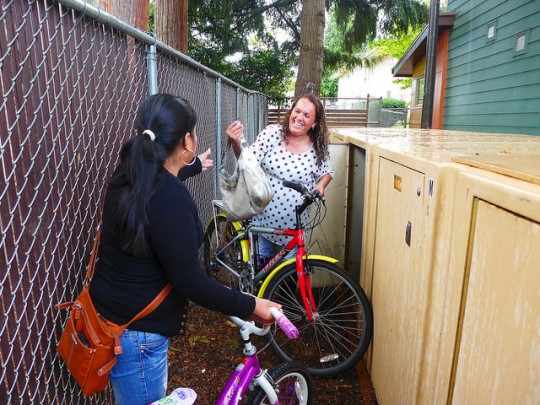
(Photo: Jaclyn Hoy for CCC)
Or to offer every Multnomah County resident one free pint of beer every Tuesday at the Lompoc 5th Quadrant, including tip. ($138 million a year.)
It’s not this simple, of course. The ways Portlanders are getting around instead of driving have some costs, too — a few more bus drivers in rush hour; the couple dozen new bike shops that have opened since 2007; thousands of bicycles; probably a few more burritos consumed per capita as more of us fuel our own movements.
This shift has already happened with hardly anyone noticing. And that’s sort of the point.
And the money being saved here can’t simply be moved from one use to another. The many thousands of families who enjoyed this savings have already spent it on other things they want … including the various tax hikes they may have voted for recently to improve local parks, schools and so on.
In other words, this shift has already happened with hardly anyone noticing. And that’s sort of the point. Not only has 7 percent of per-capita car ownership and 8 percent of per-capita driving been eliminated from the economy without overall ill effects — the local economy has been booming, with Multnomah County leading the pack.
Certainly the local economic boom is happening for many reasons. But it can’t hurt that in the last 10 years, we’ve successfully built a county whose residents don’t have to spend $138 million every year to move around inside well-crafted pieces of gradually disintegrating metal.
Imagine what other things we could do if we can keep chipping away at the $2 billion that we’re still spending on that.
— Michael Andersen, (503) 333-7824 – michael@bikeportland.org
Our work is supported by subscribers. Please become one today.



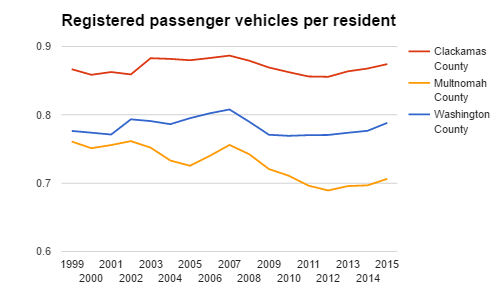
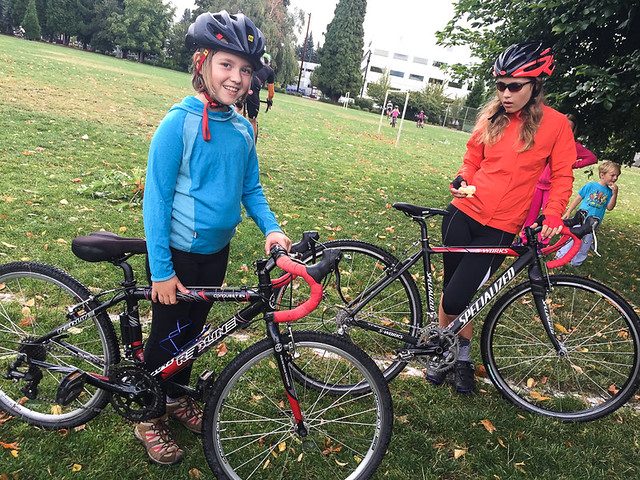
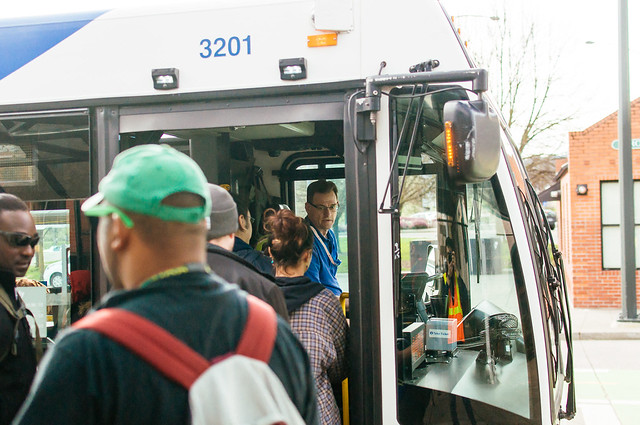
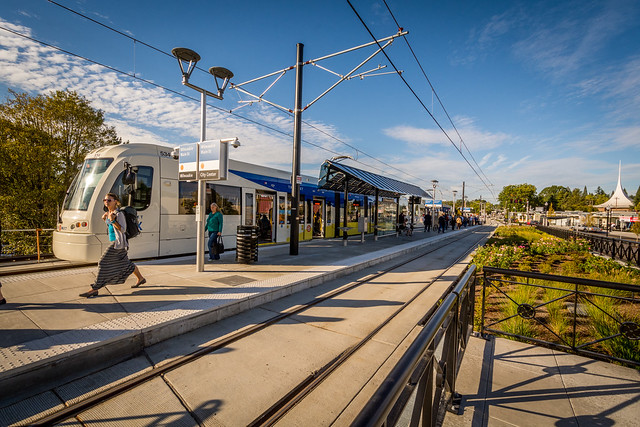
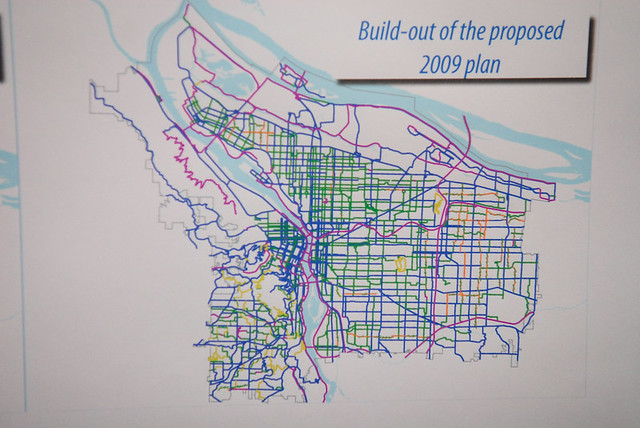
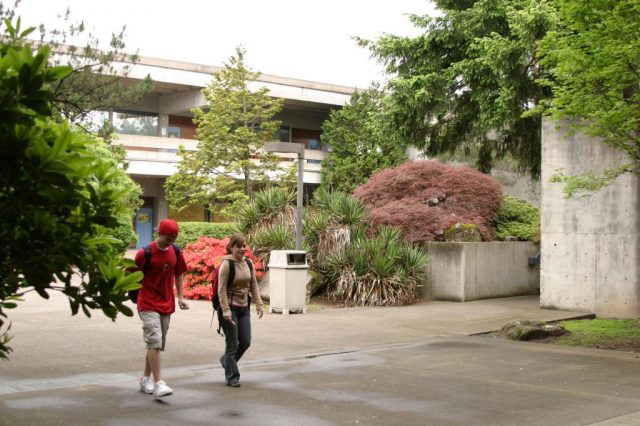
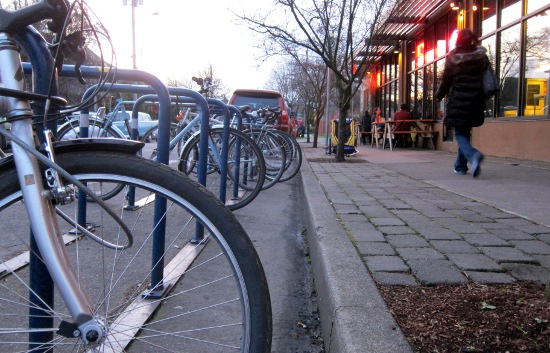
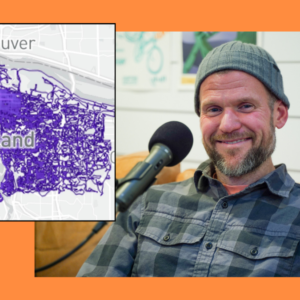
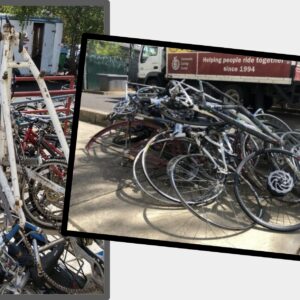
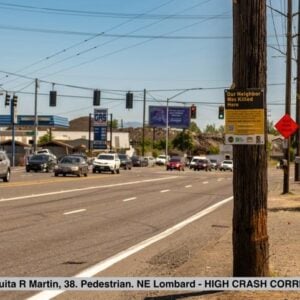
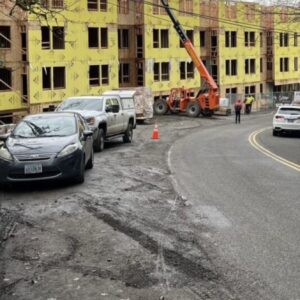
Thanks for reading.
BikePortland has served this community with independent community journalism since 2005. We rely on subscriptions from readers like you to survive. Your financial support is vital in keeping this valuable resource alive and well.
Please subscribe today to strengthen and expand our work.
Great fodder for a commercial–now can we collectively raise the money and hire a filmmaker to put it together?
I realize that what you have written is not that there are fewer cars on the road in Multnomah County, but that the rate of increase has slowed down more so than the rate of increase for the population. However, I’m convinced that the rate of car registration decline is partly offset by a rising rate of non-registration of motor vehicles in the Portland area.
To check this, I suggest checking the average daily traffic (ADT) on the I-5/405 Willamette bridges year-by-year, and see if the rate of change is greater than the reported increae in the number of registered motor vehicles.
The other proxy I would check is a year-by-year intake of the 3-cent Multnomah County gas tax, which has been around for decades. If the money collected is rising faster than the number of registered cars is rising, then more vehicles are getting away without being registered.
If however the drop is real, then it does mean less gas tax revenue for PBOT and less money for bike projects.
Dave, et al. – I would be surprised if there was any change in traffic volumes on the bridges for one big reason: I suspect the neighborhoods that saw the drop in car ownership (probably close in) weren’t using the bridges very often to begin with.
We are not necessarily talking about “close-in” neighborhoods, are we? The numbers pertain to all of Mutnomah County. Even with a 7% bike mode split, over 70% of all Portlanders are still using the single-occupancy car as their main mode to get to and from work, with an even higher percentage in Gresham & Troutdale. I agree, the most like drop is from inner Portland neighborhoods, but we are trying to measure actual behavior, rather than perceived behavior (we think Multnomah County residents may be driving less, but are they, actually?)
Yes, they really are — that’s what’s shown by the Metro chart above, which comes from Texas Transportation Institute figures explained here:
http://d2dtl5nnlpfr0r.cloudfront.net/tti.tamu.edu/documents/mobility-scorecard-2015-appx-a.pdf
The figures are for the four-county Portland metro area rather than Multnomah County. I am assuming that auto use in Multnomah County is declining at the same rate as in suburban counties. If it’s declining faster, than the numbers in this article underestimate Multnomah County’s economic savings from reduced auto use.
Reminder, a drop in auto registrations does not necessarily equal a drop in auto numbers. It might, but it also might indicate a drop in legal compliance.
I paged through the link you sent. I frankly don’t understand how it relates to your analysis.
Sorry that wasn’t clear, David. It’s the methodology for the Texas A&M data that Metro used to conclude that miles driven per capita are down 8 percent since 2007. They use INRIX traffic counts at many locations (not just bridges!) combined with various other metrics.
Michael, I think I may have found the same data you used, titled “Performance Measure Summary – Portland OR-WA”. It indicates that peak traffic has held fairly constant for the last 6 or 7 years, with minor ups and downs. But it also indicates a steady rise of “excess” fuel consumed overall and per commuter for the last 2 decades. The data is through 2014, before the huge gas price drop. Basically, while the number of reported commuters (based upon vehicle registrations) has held pretty steady, congestion has significantly worsened. This leads me to conclude that the number of cars in Portland is greater than the numbered registered, and since this ratio is rising, Portland seems to be a good community for driving illegally and getting away with it.
Sorry, forgot the pdf link: http://tti.tamu.edu/documents/ums/congestion-data/portland.pdf
Excel spreadsheet from the same source: http://tti.tamu.edu/documents/ums/congestion-data/complete-data.xlsx
…and since you are comparing numbers, the cost of congestion in Portland has apparently risen $178 million between 2007 and 2014, effectively neutralizing the $138 million in savings you have touted. 5th worst in congestion, 10th worst in commuter stress, etc. Shall we discuss the pollution from all those idling cars on Highway 26?
That doesn’t follow. If there had been less “savings”, there would be (presumably) more congestion; that is, those numbers aren’t at odds with one another (and don’t cancel one another out), but are instead somewhat complimentary.
It depends upon who is benefiting from the $138 million in “savings” versus who is paying for the $178 million in increased congestion costs. For example, if the predominant benefactors of the $138 million savings are upper-middle class whites who live in inner Portland and who can “choose” to live where they want, and if those who are predominantly paying for congestion are poor working-class immigrants, blacks, and the homeless who have fewer choices of where to live and must drive to jobs in areas with bad or non-existent transit, then I would say that there are significant social justice issues about these numbers. I’m hypothesizing – I don’t know if this is really the case – but if it was, I’d be bothered by it. Wouldn’t you?
Not really. Increasing the “savings” should also reduce the “costs”, so I think everyone wins, even with your completely invented hypothetical.
Unlike its raw data, TTI’s attempt to calculate the “cost of congestion” is pretty ridiculous. Among other things, it asks whether cars are moving quickly but completely ignores how far they have to go. This rewards cities for prioritizing sprawl and lengthening trips, both of which make congestion worse not better once you get to urban levels of density. The $178 million figure essentially assumes that the only way to control congestion is to build ever-wider freeways and arterials indefinitely. It also fails to weigh the “cost” against the cost of those new traffic lanes.
http://cityobservatory.org/another-tall-tale-from-the-texas-transportation-institute/
I agree that congestion does have costs, wrong-headed though the TTI calculation is, and I’m very much concerned about them falling disproportionately on people who live further from the Portland area’s job centers. That’s why BikePortland reports regularly on making housing in the central city more affordable. A bike-friendly city requires both good on-street infrastructure and affordable proximity, IMO.
Doesn’t change the fact that bikes are cheaper than cars, though.
However, you are using TTI data via Metro for your analysis, which should encourage you to examine and question your sources. Garbage in = Garbage Out. GIGO.
TTI’s problem is not its source data, it’s the way it analyzes that data.
No, it is the data. For example, the population for the Portland/Vancouver MSA is listed as 1,950,000 for 2014, but the Census has an estimate of over 2.3 million. It’s the same for the other cities it collects data. Since many of your other numbers are population-based, I’d say this is a major issue.
Regardless, there will always be people commuting in, so better transit seems a priority. In fact, I think I would argue that density along transit corridors is more important than density in the core in terms of reducing the cost of congestion.
Why do you think you know more about this than they do?
David, I appreciate your skepticism but I have yet to hear any reason why Portland would be seeing such a sharp drop in registration compliance when the same thing is not happening statewide, or in our neighboring counties, or nationally. Especially because Multnomah County’s median income has been improving faster than the state’s median income, the median income of our neighboring counties, and the nation’s median income.
Isn’t it more reasonable to assume that the rate of noncompliance is approximately unchanged from 2007 and that the number of cars registered to Portlanders is declining because of Portland’s pretty well-documented efforts to reduce the need for car ownership?
Have you noticed that Portland has an unusually high homeless rate? Perhaps you have, I think I’ve seen quite a few reports on it from this blog. Usually with such a high homelessness rate, there is a similarly high rate of residents who are “one paycheck away” from being homeless. In a household budget of someone on the margin, certain expenditures no longer become “necessary,” such as health insurance, car insurance, or even renewing a license. In addition, many homeless in Portland live out of their cars (as they do elsewhere). Given a high rate of homelessness and near-homelessness, and lax enforcement by an under-staffed local police department, I would expect a high rate of non-compliance of vehicle registrations and insurance in Portland itself. Since you report a drop in registered vehicles, I’m now curious, has the number of vehicles dropped, or has the compliance rate dropped?
I know that some people who do not live in a house live in their cars. They’re sort of invisible because there’s a stigma attached, they’re probably working and want to keep the car (there’s enforcement against sleeping in a car for some reason.)
What I mostly associate with people sleeping outside is constant reliance on bicycles for transportation. They don’t have the luxury of being ‘concerned ‘. I’m bemused by the Javerts commenting here about how they’d like to scrag a person for dubious possession of a bicycle. Bike theft is sort of a problem in Portland, but people who think this is a tough town need to get out more.
People who rely on bicycles have a point of relationship with the Springwater legions if either bunch were looking for similarities instead of differences.
I don’t think the last 7 years is a savings on cars but rather a reallocation of money. Rising cost of living in Portland simply removes the option for many people to own cars.
So … you’re saying people are saving money on cars and then passing their savings to landowners in the form of higher rents (as filtered through higher retail prices, etc)? I agree that the second part is bad, but why does that mean that the first part doesn’t exist?
People struggling to make ends meet in the suburban United States don’t have a realistic “option” (as you put it) to ditch cars in order to make rent. Being able to ditch a car in order to live where you want to is the point, isn’t it?
Or perhaps instead of “owning cars”, stop paying for the ownership of cars. Keep the car, but not pay for registration, insurance, maintenance, etc. Police (in Portland at least) rarely pull people over for expired insurance; updated license tags are easy to forge; gas is cheap; and parking outside of downtown is free. Reduce that $8,000 AAA cost to virtually nil, certainly far less than the rapidly rising rent in Portland.
I’ve been pulled over for expired tags, the fine is substantial – more than the tag – and if there is anything else to cite you for, that gives the officer the opportunity to do it. As for forged tags, when your plate is run, the forgery will be exposed, and now you’re in a world of trouble. Not registering a car just to save $100/yr definitely isn’t worth it.
Driving without insurance – from a purely economic standpoint, whether that makes sense or not depends on whether you have any assets. If you own nothing and don’t have an income, then you are pretty much judgment proof, and maybe it isn’t worth buying insurance. Most of us aren’t in that position.
I agree with what you say, except that the Portland police often won’t pull over motorists for the violation because it is not worth all the paperwork and hassle, especially in East Portland, and especially when they have more serious crimes to deal with. But you are right, when they do catch you, the fines can be hefty. Assuming, of course, you have a home address and that you actually pay fines. I’m not sure what they do with no-shows and absconders. I’ve heard Portland has a lot of those, who tend incidentally to be homeless. The police also know that taking away a vehicle is only contributing to the homeless issue. It’s a no-win situation.
There are a LOT of out of state license plates around town these days. It’s hard for me to believe that they’re all out here on a road trip; I suspect many have moved and not changed their registration. They will eventually have to re-register when their tags expire, but this could be another factor that makes the registration data unreliable.
I’ve had my tags stolen off my license plate. That is a growing problem here.
I was car-free for 2.5 years. With my savings I dropped a lot of $ at bike shops, locavore restaurants, locally produced food in grocery stores, and bike touring.
I’ve had a car again for 3 months now. Needed it for work for 1.5 months. Now I don’t use it. Might not keep it…
Good article, Michael, thanks for covering this.
Ted Buehler
Some people will spend their savings, others will save it; increased money in someone’s pocket doesn’t always mean an increase of money in the local economy. Sometimes it means less, if the “saved money” came from less spending at local businesses such as gas stations and repair shops, or if less tax is paid as a result.
This is not a value judgement, just noting that nothing is simple.
The vast majority of “auto spending” leaves our region. We don’t extract or refine petroleum products, we don’t have any car makers. Gas stations and car dealers have single-digit profit margins. Insurance and repair are probably have the most impact, but in general reductions in auto spending are good for our region.
To give an example: we are a one-car family. I have spent about 50% of this savings at local bike shops and to remodel our house. The rest of the money will allow us to retire early. I don’t know if is a net benefit for Portland’s economy or not, but it’s a huge benefit for us.
I think the personal benefit you identified is the real advantage to streamlining your “cost structure”, and is pretty easy to quantify.
The vast majority of “bike spending” leaves our region. We don’t extract or refine petroleum products, we don’t have many bike makers. Bike shops have single to low double digit profit margins. Repairs are probably have the most impact.
Unless you are purchasing Cielo’s and/or Breadwinners regularly and paying for a lot of bike maintenance….
Ha! See what I did there?
Brilliant, love it.
Exactly! and then you have the people that try and say bikes have no carbon footprint…except that they are using an infrastructure with a huge carbon footprint.
Do you mean that folks might, instead of driving to the mall as they used to, be ordering from Amazon and such, and that part of the $138 million is going to increased profits at Amazon, FedEx, and UPS?
That’s not what I meant, but it might well be true. I was suggesting that more money in people’s pocket does not necessarily translate into an increase in money circulating in the local economy. It is now easier than ever to spend your money in ways that the local economy never sees it.
People work at malls, and people work to deliver products from Amazon. I don’t know if that change in commercial habits would be good or bad for the region. Are malls a good thing for our society?
A good thing or not, malls are disappearing. Online retail is gradually killing the mall anchors – retail profits are dropping nationwide. Most cities have too many, often with several derelict centers and strip malls.
Oh, and I bought a Bike Friday Pocket Llama, too.
https://www.bikefriday.com/folding-bikes/bikes/pocket-llama/
Ignoring the health consequences of driving in an economic analysis is like ignoring the gold in a gold mine and focusing on the value of the other metals present. Sedentary lifestyles, of which car use is the major cause, and the toxics emitted by automobiles are known to cause diabetes, hypertension, heart disease, cancer, COPD, obesity, exacerbate arthritis (both osteo and rheumatoid) and damage brains on a level similar to ingesting lead paint chips among other woes (like the 2.4 million hospital trips for auto-caused injuries and the nearly 40,000 deaths per year).
Healthcare is about 20% of the total US economy and those ailments are most of healthcare, although not all of any of them are caused by cars, the percentage cannot be insignificant.
why do you assume that these people are any more active than they were when they had a car?
Bikenomics.
The average income in the US is dropping. Inflation though low is still existent. Just because people don’t have a car doesn’t mean they have any more money to spend on anything other than the necessities of life. Particularly those on the lower rungs of the economic ladder. A group that is growing larger each year.
And I’ll bet that $700 every 4 years for a new bike, has more than been eaten up by taxes, rent and general inflation
Ah, and let us not forget property taxes and Netflix subscription increases.
It may be true that people are spending less on automobiles, but the money is probably being used on other “necesseties”.
Just as important as the amount of money saved, is the way in which the saved money is spent compared to auto based transportation expenses. Most of the $8000 per year ( using AAA’s number) spent on annual auto expenses immediatly leaves the local economy. Most of car capital cost goes far away, financing costs, insurance payments and fuel also leave the economy. The person who ditches their car and stops feeding the global corporate machine ( assuming their income stays the same) can support local food, bike shops, framebuilders, brewers, restaurants and crafts. Money spent this way is recycled many more times and benefits the local economy much more than dollars flowing to Auto Companies, Mega Banks and International Insurance companies. Giving up cars, buying local and standing up to out-of-town landlords is the best way to improve any local economy.
Or, looked at another way, money that was once spent at local gas stations, insurance agents, car dealers, etc., may now go to buying gewgaws from Alibaba, a new subscription to Netflix, or into an account invested in stock market index funds.
In other words, money could be taken out of the local economy and spent feeding the global corporate machine.
It’s hard to generalize, because the details are really important.
Or to Shimano, Starbucks, Pottery Barn, and numerous other multinational corporations expanding into Portland wallets, as well as rapidly rising rents (to California & NY hedge funds) and oversized mortgages (to major banks.)
I have long thought that one of the reasons so many apartments are going up in portland is that in most places rents are pushed up against what people can afford (30-35% of income) because there is nothing more left after food, car expenses, health insur, etc. But in Portand the landlord-industrial complex has figured that they can squeeze the renters to even higher percentages of income for rent because in a pinch the renters can ditch their cars and put all the money saved towards rent. Yay! future as rent serfs.
What I don’t fully understand is why people without means move here given the high rents. Given the number of interesting cities in this country, moving here and becoming “rent serfs” is clearly something people do voluntarily. There are (plenty) of other choices.
As I’ve said before, if I were setting out for greener pastures, I’d be looking for the next Portland.
I think this all the time. There are many other greater (and much cheaper) places to live. People are fixated on Portland in a very obsessive way. I blame the internet. And a particularly trend-obsessed society.
Cheaper and greater cities than Portland? I have to disagree here. Portland is a fantastic city, and people who have lived here and moved away tell me how much they miss it when they return. I think that’s why people continue to move, and struggle to stay, here.
The question is not which cities are greater now, but which ones will be great in 5, 10, or 15 years. Move to one, help catapult it to greatness, and become one of the curmudgeons who bought their house for $150K and complain that the newcomers are ruining everything.
Portland has lost its early-mover advantage. Other places have not.
Dang, I missed that question. I still would argue that Portland will be great in 15 years, despite Portlandia, the long breakfast lines, and the water being drained out of the Tabor reservoirs.
I hope it is… but other places will be great too.
All I’m saying is that there is much more opportunity if you are early to the party than if you show up late. Some cities are just wheeling out fresh kegs, while Portland is starting with the Jaegermeister shots.
agreed. I have this discussion with my riding partner all the time. What’s the next place? Boise?
I wonder whether we’ll have any MTB trails 15 years from now.
As a personal testament, I moved to Portland in 1997 for the PSU planning program. I moved out in 2006 to take a planning job in the Midwest. Hated the weather, the bland culture, and missed Portland terribly, so I quit after a year of work, moved back to Portland in 2007, took a low paying temporary job, then was unemployed after 2008. I continued to live in Portland long after I could no longer afford it, because it was so friendly (and bike friendly, too.) But the last two years I saw a huge rise in rents accompanied by a huge rise in local rudeness by people I didn’t know. So I left last December for Greensboro, NC, which I found by doing some exploring of other places. Sure, biking here sucks compared to Portland, but the rent is less than half, people here are REALLY friendly (Southern charm?), and as a community advocate looking for projects, I’ve hit solid gold.
Portland has a nice climate and interesting culture, but there are lots of other nice places out there. Go explore. Go ride.
And who knows? If your advocacy (and those of like-minded souls) pans out, biking might be much better in the future.
Yes! There are sooooo many cities. Can Portland REALLY be the ONLY ONE? The weird rabid tunnelvisioned focus on Portland alarms me. Portland attracted next to NO attention for most of my life. The internet and hype did us in.
Echoing HK and David–go find the place that attracts next to no attention now and move there! Do it! Portland had all its beautiful features and bones way back before it was the center of TrendUniverse, and….nobody noticed! There are places with beautiful features and bones out there yet that are (bonus!) cheap to live in AND the communities WANT NEWCOMERS! Think of it! Ahh! Like some kind of heaven! Only, without a Lardo. Dare you risk it?
This is happening in nearly every large city in America. Housing prices are skyrocketing because everyone wants to live urban now (a great thing) but we have limited urban space, since most urban environments are now illegal. People are moving to other cities too, it’s just that Portland is attracting more people because it happens to be more livable than Tulsa, for example. There are only so many pre-1920’s neighborhoods to go around.
There are tons of pre-1920s neighborhoods around. Just not as many on the west coast, which developed later.
What is it about the old neighborhoods that people like? Part of it is, I am convinced, the attractive housing stock. If Ladd’s Addition, for example, were all 20-30 year old modern apartment buildings (with the corresponding loss of greenery), would it be so attractive?
The biggest thing is walkability and density. Neighborhoods built after WWII were more spread out, less walkable, and further from amenities. By the 1960’s we had completely engineered walkability out of our newly-built neighborhoods.
The grand irony of all this is the anti-density people in Portland not realizing that density is what makes their neighborhood so livable and attractive in the first place.
I have spent some time in the pre-pre-1920s suburbs of Boston, and none of them that I have visited seemed particularly walkable. They were mostly less dense than Richmond, but what they had in spades were nice old houses, and lots of trees and greenery. Housing prices there make Portland look like a bargain. The same was true for the older neighborhoods I visited in Minneapolis and elsewhere.
I notice you did not say that Ladd’s Addition would be more attractive if it were redeveloped. Why did you choose to live in Richmond, and not, say, South Waterfront, where there is plenty of density to go around?
Well, for one, I could not afford South Waterfront. The area I ended up living in was one of the few I could actually afford while being inside 82nd.
But, if you could’ve afforded South Waterfront, would you have preferred to live there, Adam? Not goading—genuinely curious.
Probably not. Never really been someone who wants a the high-rise condo lifestyle. When I lived in Chicago, I rented in a high-rise for a year – didn’t really love it. After that, I was in a two-story mixed use building, then a small-scale apartment building for two years that was similar to the developments on Division. I do appreciate the good urban planning decisions for South Waterfront and still see it as a good model neighborhood; but just like River North in Chicago, I find it to be a bit sterile.
I will say that something like Division is my ideal Portland neighborhood. Reminds me a lot of the neighborhood I lived in in Chicago. There are lots of reasons why I didn’t like Chicago, but I did like my neighborhood, which has a lot of mixed-use buildings on the main corridors, medium-scale apartment buildings between, as well as detached houses (many of which were converted to duplexes or multi-unit). Very similar to the NW District, as it was built up around the same time period.
Of course, that area of Division is now too expensive for me to afford, which is why I ended up at the very eastern edge of Richmond, across the street from South Tabor and a block from Foster-Powell, in a house that could use some cosmetic updates (no lovingly-restored bungalow for me!). I’m closer to 50th and Foster than the densest part of Division, so I’m hoping those streets get built up in a similar manner. I’m very excited about the Green Zebra going in at 50th and Division.
“What about 1920’s neighborhoods is so attractive”
My theory is that they’re pre automobile and they just “feel” better. More human scaled and not built to move the maximum number of cars per hour. To kind of twist your words a bit, do you think Ladds would be what it is with the same old houses but each road running through it a 4 lane high speed road? Doubtful. And what’s really sad is that that kind of development is never going to come back.
Of course it wouldn’t be. I too prefer human scale streets. But if you spend time in a low-traffic modern subdivision, they are soulless places, and it is not because of cars driving by. The architecture of the space is very different.
Hope I’m not butting in, but can’t resist in regard to Ladd’s Addition–no, the 4-lane high-speed road would certainly kill its character. But I think quiet 4-lane roads would, too. Part of what I think makes Ladd’s great is the sense of enclosure to the streets–they’re fairly narrow, they have HUGE trees lining them, and beyond the trees on many of the streets are tall (many 2.5 or 3 story) broad houses. They combine to create streets feel like roofed, outdoor spaces. Most Portland residential streets have no sense of enclosure or space at all–it’s just what’s leftover between the rows of low houses.
Also, Ladd’s has alleys, which means no driveways, garage doors, or curb cuts along the street.
Will this type of feeling ever come back? Portland is currently working on requiring new houses to be much lower than many that people love in Ladd’s, and requiring greater setbacks from the street–both moves that run counter to some of what makes Ladds so great.
I find Ladd’s nice during the day but actually quite creepy at night. I find most of Portland’s dimly-lit and devoid of people neighborhood streets creepy, but the large trees in Ladd’s block even more of the street lighting, making it very dark. Luckily, my street is well-lit. I’d much rather spend time on a street like Division where there is plenty of lighting and people out during most of the night. What I find “charming” is not building appearance but rather how the buildings integrate into the urban fabric. In this regard, Division is much more welcoming than Ladd’s, which promotes isolation. This can be accomplished with new or old building stock (though I do like older buildings better).
I agree with the sense of “enclosure”, but will add that most houses in Ladd’s have pretty generous setbacks.
Compare that to the redeveloped Division. That is also “enclosed”, has tall buildings (and much smaller setbacks), and has a street that I would geuess is narrower than (or at least comparable to) Ladd Avenue. Most people would probably find it a less pleasant place to live, in part because of the high density, and the general sense of “business” that accompanies it.
The people I know in Ladd’s don’t seem particularly isolated… they all know their neighbors, and it has a real sense of identity and community. Their kids walk down the street to play with neighbor’s kids. It’s quite pleasant, actually.
I live on a residential but fairly heavily-motor-trafficked street and I rarely see my neighbors out or kids playing. I find the density on Division creates much more of a sense of place and community than the wide open streets of Ladd Avenue or even the street I live on. My street functions mostly as a car sewer, whereas Division has more going for it than simply moving cars.
Ladd’s certainly does have it’s sense of identity. You know instantly you’re in it by the street grid changing. It also has about as clearly identifiable “center” as possible, that lots of residents travel through on their way in and out, and even the coffee shop adds to that whether you go there or not. The other four, secondary traffic diamonds also help.
50th does not seem conducive to building the sort of communities that develop along other streets. Nor does Division, even if it is a good place to get dinner or have a glass of wine.
Adam–I like hearing your impressions about your neighborhood, Ladd’s, etc. Every neighborhood should have a “center” where people can meet. With no center, the neighborhood isn’t as readily identifiable, and is certainly less livable. In mine, the center is a park. That’s how I first met many of my neighbors–everyone out in the park. The type of center–park, busy street, grocery store–has a big impact on the neighborhood character, and who’s attracted to live there.
There is a nice neighborhood park nearby that functions as a community center. Once construction at Franklin is complete, that will also function as a prominent neighborhood landmark. However, the street is fairly busy. To give some perspective: it’s three times what PBOT considers acceptable for a Neighborhood Greenway, and ten times the total traffic counts neighbors on Woodward were concerned about the Clinton diverter causing. I do believe that the heavy motor traffic degrades the neighborhood cohesion, and there has actually been some research to support this.
Streets themselves should function as meeting places, which is why Division works so well. 50th from Division to Powell is mostly empty buildings and gravel lots, but it is all zoned the same as Division, so it could someday function the same way. Buildings built to the lot line add continuity to the street, whereas empty lots or large setbacks break it up. People love to complain about density, but density brings more vibrancy to the neighborhood that a vacant lot or boarded-up building cannot. Empty streets look dangerous and creepy, whereas ones filled with people going about their day feel lively and safe. It’s the classic “eyes on the street”.
It’s so strange that you keep saying that areas like Ladd’s have no continuity (huge setbacks), and that the neighborhood isn’t vibrant (low density). Those are exactly the things that the people who live there and pass through it love about the neighborhood — it has significant continuity and is quite vibrant. It also has a wonderful sense of community.
Division is certainly vibrant, but it is not a good place to raise a family or develop a sense of community with your neighbors. That’s fine — different people want different things at different times of their lives; but I would assert that the vast majority of Portlanders would prefer living in a neighborhood like Ladd’s to living on Division.
Perhaps a way that assertion could be tested would be to see how many residents along Division moved to their current location from the leafier neighborhoods of Portland vs. the number who moved there as a landing pad and planned to eventually move on, or to compare the tenure of residents (once enough time had passed that such a thing could be meaningfully measured), or perhaps to measure the number of neighbors residents associated with.
Adam–your comments remind me of when I lived Italy for awhile, including in a medieval (actually older) hilltown with no auto access, and also spent a lot of time in other hilltowns. The streets and piazzas were everything. All public activity happened there. At night, 100% of the residents were in the streets and piazzas, socializing. There were no sidewalks. “Streets” included passages no wider than a few feet between buildings, all lined with shops/utility spaces on ground floor and dwellings above. Living in an environment like that changes your perceptions of what streets and urban life can be.
Kitty, I plan on raising a family and my wife and I consider being close to Division an asset. When we go for walks, we often will head to Division. Some people value different things about a neighborhood and I think you’d find that “most people would like to live in Ladd’s” to not be correct. Clearly lots of people want to live on Division too. Division is not just a playground for tourists, there are plenty of locals there at the bars and restaurants, as well as plenty of non entertainment-focused amenities.
q, I love that about European cities! People consider the street to be a collective front yard rather than simply a conduit for moving cars. Here in Portland, we have a long way to go, but streets like Division and 26th/Clinton come close. The sidewalk cafes and people out walking add the appeal of the neighborhood. Public gathering places create a sense of community.
Don’t get me wrong — I like living near Division as well. I know many locals eat and drink there, and it is a fine place to stroll on a nice evening. All I’m saying is that living directly on the street is not as conducive to building a sense of community with your neighbors as are the nearby residential neighborhoods, and that sense of community is important to a lot of people. I am further suggesting that is the single-family houses that make them conducive. I do not doubt that people want to live on Division; I totally see the appeal for certain demographics.
Check back in after you have kids, and let us know if your viewpoint changes.
Interesting conversation. Thanks for the response to my question, Adam. Just two things to add—first, re: “The grand irony of all this is the anti-density people in Portland not realizing that density is what makes their neighborhood so livable and attractive in the first place.” I think you’d find pretty much anyone living here for any period of time appreciating the level of density we HAD—that to which you’re referring. We (you and I) just disagree on the intensity of the density (I rhyme!), and it’s simply going too far for many of us, threatening and actually destroying the very things (“livable, attractive neighborhoods”) that drew you and other people here in the first place. There is a limit. Good things can go bad if people don’t know when to say “when.”
Second—not a fan of bright light—esp. the artificial kind—so I’m always glad to see the dark at night (and, if I’m lucky and the pollution’s not too bad, the stars). The dimness you describe in Ladd’s strikes me as peaceful, restful. Light pollution sucks! Our outdoor lights are all directed downward and are normal strength—not klieg-like, which seems to be more and more the norm these days, necessitating blackout curtains all around. p.s…I really dislike the new streetlights. Ugh. They burn a hole in my eyeball.
I live in a 100 year old house and I can tell you, there’s nothing magical about them. They’re as good as the worst owner to take care of them over 100 years wanted them to be. Everything from electrical systems to closets is substandard.
You can see apples to apples comparisons every time an old house is torn down and replaced with a new home. How much more does a newly constructed home sell for compared to existing ones?
Well, it’s not the argument I was making, but in most cases the older homes that are replaced are the smaller onesreplaced, by a larger one. Of course the price goes up. What would support your point would be if we saw good condition older houses replaced by houses of a similar size, with a large increase in value. That’s rare.
We (me and mine) got rid of our only car 4 years ago and hardly noticed. We live close-in, though, are kidless and are near our jobs, which subsidize bus passes. We mostly walked and used our bikes and mass transit prior to ditching the car so the change wasn’t jarring, but we do need to drive distances occasionally and so we rent a car (Zipcar or some other) or (again) take public transit, if it’s available. We don’t even have Car to Go and it’s still easy, this close in.
Our neighbor across the street has (at last count) 5-6 vehicles and has just parked yet another (a huge van/truck) on the street, already strewn w/ their vast collection. When you live this close in, it’s easy now to go without a car, and such a savings. I wonder if people in these near neighborhoods don’t realize how easy and convenient it’s become?
Good story–thanks.
In general, people are pretty stupid when it comes to financial decisions. Of course, owning 5-6 cars is a terrible idea. It wastes money, as cars are depreciating assets that require maintenance, registration, and insurance, and it wastes valuable public space that could be used more efficiently.
But yes, the fact that a majority of Americans have little or no savings for retirement should be a good indicator of the collective financial competency in this country.
I’ll bet the owner of those 5-6 cars is buying and selling them, and using the street to store them between purchase/sale, a fairly common practice that is, I believe, illegal.
I have lived near that kind of neighbor before, but alas–these cars are actually theirs. It’s one of those One SUV Per Family Member families. Perhaps multiple (or two) families living there. The neighboring house is the size of a breadbox with several Texans stuffed into it, as evidenced by the numerous Texas license-plated vehicles permaparked at the curb.
Maybe you should sell their cars for them. That might help solve the parking issue, and put some money in your pocket.
But the real question is why are Texans living in a breadbox? I thought they liked things big!
What a great idea! And you will have to ask the Texans. I’m not kidding–that house is WEE.
It is weird how American cars are sold like Pez. The one car we had that we got rid of was a 1996 Honda Civic. It was $10,000 new, which seemed horribly expensive to us–not a little purchase! We had bought only $1000-2000 used cars up to that point. I can’t fathom how so many people “afford” these $20k-and-up vehicles, or why car companies are always making more more more more.
New cars and new cellphones = same thing. We buy monthly contracts and merely use the car or phone. The contract is the gun to our head. We NEVER bother paying it off. We sell it cheap to the next dude who wants a better VW. He pays under this own bank loan, probably 9% APR due to poor credit score, and my 0% APR contract is paid off. I go buy an brand new Audi, put another gun to my head. 😀 Rinse/repeat.
That is a good summation of our collective craziness.
It sure would be nice if even half of the bike network were built out already.
The savings numbers look even better if you figure that with taxes, you had to earn more than $1 for every dollar that you’re not spending. So if didn’t spend say, $1,000 by not having a car for a year, you saved yourself from having to earn something even more than that.
I hope not. I haven’t been able to drink Jag since my 21st bday. I hear what you are saying. There are just things about Portland that are difficult to find in other places that make it so great, minus the local mountain biking of course. Proximity to the ocean, old growth, high desert, etc. The city itself is great, but it’s also the other things. Anyway, I’m glad to be here and feel fortunate that I am not trying to afford a place to live these days on a starting teacher salary.
The things I love about Portland the most have nothing to do with the city of Portland.
Name another city where I can bike comfortably on relatively safe infrastructure 9 months of the year, ski mountaineer in the winter, rock climb nearly all year long, and go to the beach; all within a 2-3 hour drive? I can think of a few other smaller resort-type towns, but I don’t work in the resort industry.
Who are all these people that can afford to go to the mountain and coast all the time?
Most people could afford it, but they choose to spend their money on other things. Expensive houses, leased cars, eating out, etc.
This is how we do it:
– Small house
– Share one car, use bike/transit
– DIY as much as possible (house/car repairs, cooking, etc)
In general, live frugally in your daily life, and spend money on experiences instead. If you carpool to the mountain or beach, you are only looking at $10-20 for the trip per person. Skiing is only expensive if you pay for lift tickets, and the beach is only expensive if you rent a house.
Eating out is only expensive if you don’t dine and dash
[the above comment is humor]
My wife and I for two. My brother, for three(granted he is rich, pulling in $33k a year!) And about everyone I know that mountain bikes, surfs or climbs (a lot of people)
If you are skeptical of my assertion, try driving back from Mt Hood or anywhere on the coast on a Sunday afternoon.
Personally, I cannot afford to not escape Portland for the more wilds of the PNW ALL THE TIME. And should life, not resources beyond time, prevent my frequent escapes, I find the rivers, sloughs, Forest Park, Sauvie, growth boundaries, etc for quick and reckless abandonment of responsibilities.
For all we discuss pavement and concrete in Portland, what brought many of us to Oregon is the rich dirt.
And now that the Willamette is sort of clean… SWIMMING!!
Never…in a million…years. Shudder!
On a hot day, it’s really nice. Try it!
Blecccchh. Blecchhh! Ew! Ick! NO! Have you really swum in the Willamette?
I have, and will do so again. Happily. The water is pretty clean, and oh so refreshing!
I’m in it year round every time I fall off my standup paddleboard. There used to be nobody out there a few years ago. Now swimming/wading is pretty popular at Oaks Park. It is really nice on a hot day.
The Willamette is much cleaner than people think. The sewer overflows have been cut way down, and swimming is fine in summer, except for the toxic algae blooms.
However….the Willamette feels like a mudhole compared to Lake Washington or Puget Sound in Seattle. And access to it, especially for swimming or walking at the water level, is dismal. Seattle has acres of nice waterfront parks for swimming and other recreation. Portland has hardly any, and I believe none with lifeguards. Dogs in Seattle have more swimming options than people in Portland.
On what are you both basing the idea it’s clean? Between the industrial waste (and Superfund site), Ross Island Sand & Gravel filling river holes w/ toxic sludge, and the sewer overflows, not to mention the, er, ‘direct deposits’ going on from numerous riverside campers, I am keeping my fingers crossed that neither of you start sprouting extra limbs! Or pink eye.
I swim near the Hawthorne Bridge, off the dragon boat dock, well upstream of the superfund site. As for “deposits”… well, it’s a big river, and they would get diluted pretty quickly.
I don’t drink the water, and I shower when I get home, so I think the risk is pretty low. And hell, the extra hand turns out to be useful.
rachel–I’ve seen info (sorry, can’t remember source) showing pollution levels. The Willamette comes out fine for swimming in, especially now that the sewer overflows have been almost eliminated. I wouldn’t swim in the Lagoon or downstream from downtown and the industrial areas, because that does seem creepy. And I’m above water most of the time, not actually swimming.
But as I said, there’s no comparison to places like Lake Washington, where I’ve swum lots, and you can swim from sandy, debris-free beaches and see the bottom clearly even in 25′ deep water.
And the squatter boats are horrible. I wouldn’t swim near those. The river is their sewer, and they need to be moved.
The fact that there’s so much available within an hour or two of Portland is great for people who appreciate that, and people do move here for that. On the other hand, there’s something to be said for having recreational opportunities available right in the city.
Example–Seattle has far more places to swim outdoors (out of pools) than Portland. I think Seattle has more places for dogs to swim than Portland does for people. Personally, I’d trade the ability to swim in a clean lake 5 minutes away after work every evening for the ability to get to the ocean in 1.5 hours.
So it just depends on personal preferences. A lot of places to live don’t have beaches and snow an hour or two away, but they have other offerings that are just as good or better, depending on the person.
And time matters too. It’s not just finances that get in the way of going to the mountains or beach.
Just as an example, Salt Lake City has beautiful mountains just at the edge of town, and the world’s best desert scenery with unlimited hiking and biking not far to the south.
And I agree that anywhere that offers urban unpool swimming gets a doubleplusone from me. There seems to be a lot more of that on the east coast.
And if you like science/arts/intellectual stimulation, Portland is pretty slim pickings compared to cities that host a major university or two. (Sorry, PSU doesn’t count.)
Actually, Portland’s somewhat tiresome “where else are you only an hour away from the ocean in one direction and the mountains in another?” is an example of what I’ve said before about Portland thinking overly highly of itself. Millions of people live AT the ocean, or IN the mountains, or in other places with different, but equally-or-more desirable (depending on the person) amenities.
When people here argue as if Portland’s situation is objectively better than other places–which many do–I feel like saying, “Where else do people brag about having to drive an hour away to get to what they think is great about their city?”
That’s not the point, though. The fact that we live in a larger city with the great things it has to offer, and still be an hour away from mts/snow/ocean/old growth, is the point.
Well, what I said was MY point.
Brian–I’m not sure if you get the irony of your response.
Ahhhhh, q! THANK YOU! 🙂 I’m way past tired of the great Idealizing of Portland (and Oregon).
How does one quantify “overly highly”? If I think it’s great, but you do not agree, does that mean I am wrong and thinking “overly highly”?
Please explain what else I am thinking too highly or lowly of.
Mike–No, actually I meant the opposite of what you may be thinking. I was referring, as I said, to people who think Portland is objectively better than other cities because it’s an hour away from oceans and mountains. I’m not saying you’re wrong to think it’s better for YOU–of course that’s not wrong, because it’s a personal preference, so it can’t be “wrong”. I’m saying it’s wrong for people to tell me that I’M wrong if I don’t agree with them about that hour-away thing making Portland better than other places for me and anyone else who may have different preferences than they do.
OK. Understood.
Your statement of “Portland’s somewhat tiresome “where else are you only an hour away from the ocean in one direction and the mountains in another?” is an example of what I’ve said before about Portland thinking overly highly of itself” rubs me the wrong way and certainly reads like its’ citizens think too highly of the town they live in because of its’ proximity to the things they love. My mistake.
I do agree with you that I do not care for people telling me I am wrong for feeling the way I do.
For people who don’t own cars, the mountains and coast are out of reach. I would love more opportunities within the city for recreation, or at least easily accessible by bus or rail. Now that the Gorge is accessible without spending $100 on a car rental, I plan on taking advantage of that. There is a bus to the coast, but the schedules almost require an overnight stay, as the ride takes 4 hours each way. Same goes for Mt Hood.
Portland does have some nice opportunities within the city, and I try to take advantage of those whenever I can. A trip to the coast or mountains can quickly become an expensive endeavor. I suppose that’s a sacrifice I make for not having a car, but it does seem that people quickly forget how little recreation is accessible without driving.
Totally agree on the need for more diverse recreation within reach, but most people either own a car, use the car rental services, or know someone who owns a car. It’s not that difficult to get out of the city to play time and again.
But regardless of whose car it is, it’s still a car.
Replying here since I can’t reply to your post regarding irony, for some reason.
You mean that the things that I love to do that surround Portland require me to use a car (for now) to access them, which has a negative impact on the very things I love? Reducing car trips is one of the reasons I have put time into trying to get better off-road cycling opportunities within Portland. I have also tried to move the trails from Ashland or Oakridge to Portland, but that is a pretty big task.
Brian–well, that’s ironic, too, but it’s not what I meant.
Brian–I mentioned how it gets tiresome hearing people insist that Portland is objectively better than other cities because the ocean and mountains are both only an hour away. That IS great for some people. Others don’t care about what’s an hour away, preferring to have the things they like–that Portland does not have–right in the city where they live. As examples, some people like to live right at the ocean (and millions do) even though there are no nearby mountains. Others don’t care about oceans or mountains, but like in-city cultural things Portland lacks.
You responded by dismissing everything I said with ‘that’s not the point”, and went right back to saying how we’re an hour away from the ocean and mountains. That’s why it was ironic.
Yep. I enjoy the coast once or twice a year, but have no interest in going to the mountains. Admittedly, I am not a nature-lover – I prefer my nature in small doses and easily accessible from within the city. Even when going to the coast, I prefer to visit cities like Astoria over isolated beaches. I moved to Portland because I liked the culture, weather, progressive planning, and because we have nature within the city. I can walk to Mount Tabor from my house, spend as much time as I want there, then end at a bar for dinner and drinks. I don’t feel the need to drive to Mount Hood for that experience.
q-For some reason, I don’t get the reply option for a lot of posts in this thread. I definitely did miss that important word, “objectively,” and your point altogether as a result, possibly because I don’t think I have ever heard of someone who talks of their love of Portland for reasons X, Y, and/or Z as the result of some objective metric. I have never heard, “Portland is the best city for everyone because of ____.” I’m just glad to have landed here for many of the reasons Adam alluded to, as well as many others. Though, no doubt, there are many other cities I would also love to call home.
@ Adam
You mentioned how you’re not much of a nature-lover or that you enjoy it in small doses here in the city limits. I agree, there’s so much nature opportunity in Portland, it’s very easy to get your fix. However, I’m sort of on the other end of the spectrum—I love nature and being out in it: to camp along side a river and breath in the fresh air, ride my mountain bike up a mountain, the simplicity of a trail run, walk on the beach barefoot and feel the sand between my toes, jump naked off a bridge into a lake, backpack into the most remote locations and not see a single other person for days, feel revitalized from a soak in a hot spring, view a Bold Eagle in the wild, ride a century out in the beautiful Willamette Valley, reel in a fish off a roaring river and know that your protein for the night is from a good source, paddle board in a reservoir and eat your sack lunch on a body of water 300 feet deep, cross country ski into a snowy cabin and drink hot toddys next to a complete stranger.
All 1-4 hours away!
I was born in Oregon and I love this state! There’s so much to see and I just can’t possibly see it all by bicycle. My partner and I value nature over being stuck in the city. We channel our finances to be able to leave for the weekend. We have 12-14 good weekends during the summer and we plan on being out out the city two-thirds of the time. This would cost us a small fortune to rent a car every single time. We have a used paid-for fuel efficient vehicle. We can dent it up, scratch it, get it dirty, because it’s ours.
We love Portland and what it has to offer. We live here primarily because we don’t want to leave the state and Portland, being the largest city, has the best jobs and opportunity. Plus, family lives here.
So, sometimes I feel like the conversations on Bikeportland demonizes individuals who own cars and it kind of sucks. Oregon is my home and I want to see it. I’d rather be out running a trail than sipping my over priced latte from a company owned by someone out of state (although I do like lattes). When you’re out in nature, you feel pure, you feel free. Sure, you can get the same experience in certain places in Portland, but you’ll probably have to circle the block to find a parking spot.
I’ve iterated this many times on Bikeportland: “you don’t need a car for transportation around the city, you need a car to transport yourself out of the city.”
P.S. When my partner and I get married, we plan on touring the Puget Sound on our mid 80s tandem bicycle for our honeymoon. We’re going to complete the whole trip from our doorstep without using a car; so yes, we do find ways to get out in nature and have these prolonged experiences without using a gas guzzling vehicle.
Sure, and my wife and I use Zipcar for day trips. We don’t have to pay for monthly car payments or maintenance, but that also means that any trip to the coast costs at least a few hundred dollars.
Wow, that’s spendy. Time to make some friend with cars so that you can carpool to the Orygun-fun.
Adam–there’s a service called Caravan that goes to the Central Oregon Coast. You just need to make reservations and be able to get to Union Station or the airport to catch it. It’s $52/person one-way, so not a big money saver, unfortunately.
I’m with you on the bewilderment re: how much 1) money and 2) free time so many Portlanders seem to have nowadays. ??? And in my opinion, we have so much going on in our city and environs, it’s created a frantic vibe here which I really dislike. Frantic people, frantic drivers, careless/inexperienced hikers and weekend “adventurers,” etc. etc. It’s really stressing and degrading Oregon nature spots and putting heavy stress on rescue services and small law enforcement departments (i.e., Hood River).
I suggest everyone just stay home and read a book once in awhile. Dang, Portland. Take a valium! 😉
Doh! Caravan’s a little less or more, depending on where you get off. I think it’s $41 to Lincoln City proper.
Oh, I didn’t know that! I’ll check that out, thanks! I do love to travel, but I also enjoy spending most weekends just hanging out in the neighborhood.
In my opinion, people with more money and free time than me should be spending their weekends at home.
I love nature as much as the next person. My back yard has squirrels and birds and a little grass. No need to go to Mt. Adams. Everyone should be just as complacent.
Now where’s my Xanax and wine?
Mike2–what’s your point? Nobody’s being critical of how you spend your time, and you shouldn’t be critical or sarcastic towards people who have different preferences than you do.
“I’m with you on the bewilderment re: how much 1) money and 2) free time so many Portlanders seem to have nowadays. ??? And in my opinion, we have so much going on in our city and environs, it’s created a frantic vibe here which I really dislike. Frantic people, frantic drivers, careless/inexperienced hikers and weekend “adventurers,” etc. etc. It’s really stressing and degrading Oregon nature spots and putting heavy stress on rescue services and small law enforcement departments (i.e., Hood River).”
Sounds a bit critical to me.
How much time/money I may, or may not have, and how I choose to spend it should not be of anyone else’s concern. Seeing as how I work a m-f job, I am one of those weekend “adventurers”. Don’t like it – OK – don’t participate. Just don’t tell me I should stay home because you think it’s too “frantic”.
“I suggest everyone just stay home and read a book once in awhile. Dang, Portland. Take a valium!”
Again, as commented previously above, I do not like people telling me I am wrong for feeling the way I do, or to conform in a manner that suits their personal desires.
If he instead expressed it in terms of reducing CO2 emissions from driving, would it be more tolerable?
Oh, not complacent, Mike2–annoyed! By all our beloved public spaces getting trashed and overused by overzealous hyperventilating newbies and tourists. “Consume Oregon!” should be TravelOregon’s new motto.
http://www.statesmanjournal.com/story/travel/outdoors/2015/07/02/beautiful-crowded-top-places-avoid-oregons-outdoors/29544227/
The constant search for stimulation is a relatively new (annoying) development amongst humans, fed by smartphones and social media. We used to all be much better at entertaining ourselves–esp. around these parts. As a born and raised lifelong Oregonian, I can verify outdoor pursuits are in our blood, here. As a kid we all had compulsory swimming lessons in school, plus Outdoor School where we were required to learn about the outdoors and how to respect nature. Oregon’s natural spaces were pursued far less frantically than they are now, and with more respect for the environment since every schoolkid was taught those important things.
Apologies if you felt caught in the crosshairs of my bile! I’ve no doubt at all that you’re one of those who enjoys the outdoors and takes care of nature, too. p.s…er…no Xanax for me, thanks. But I’ll take the wine! And the squirrels. And the birds.
Out of reach? It’s 60 miles, maybe. Ride a bike.
On the highway over mountains? No thanks.
Gravel grinder, dude! I have always wanted to ride from PDX to Timberline, but the thought of riding on that shoulder for that long keeps me from attempting it.
That ride to the beach is seriously dangerous–avoid it.
Yeah, it looks seriously scary. The “Oregon Coast Bike Route” is just the shoulder of busy Highway 101.
60 miles is about 4 hours, times 2 to get back, so around 8 hours biking. Not realistic or desirable for most people, especially if you add kids, or someone else who’s in lesser condition.
For a young man with no kids, who rides a bike all the time, it shouldn’t be a problem.
Really really dangerous, though, and unpleasant. I used to ride 101 from Gleneden Beach to Otter Crest Loop, and it’s harrowing. There are sections, like the dip by Fogarty Creek State Park just south of Surfrider, that have ZERO shoulder and semis roaring past you (hopefully not into you–several cyclists have been killed along this stretch).
And now you know exactly why so many people in Oregon own vehicles.
@ Mike,
True, I hit 25,000 miles on my bike before the age of 30. 24,000 of them are in Oregon.
It depends what you call ‘recreation’. Sometimes one wants to ‘get away from it all’ and that pretty much requires travel.
Portland- the least diverse, most gentrified city in the USA.
But at least we don’t like cars.
Hallelujah
I recall people in the early 2000’s talking about how “diverse” Portland was. Having lived in Chicago and DC, I was like “what in the world are you talking about?”
Mostly liberal does not necessarily mean diverse. It means most people agree on most things. It seems like this lack of diversity created the environment for ‘competitive progressiveness”, where people tried harder and harder to be different, often in the direction of being more liberal.
We do, just when someone else is driving or paying for it.
voodoo mathematics
The findings here seem to go against recent findings that show Portlamders own 1.46 cars per household, more than Miami, and about on par with Houston.
Op/Ed (column? whatever.) from Steve Duin in the Oregonian. Elided and emphasized snippets follow.
http://www.oregonlive.com/news/oregonian/steve_duin/index.ssf/2016/07/steve_duin_congestion_has_a_ch.html
Well, they don’t spend as much time in their cars as you log in yours, Steve.
(I guess “downtown promenades” is the Ankeny Alley/Voodoo Donut thing)
Steve really confuses me. He seems to say wise things but then he’s trying to use those facts as some way to advocate for provably stupid ideas like freeway-widening? “Better Rose Quarter? Better Powell? Better Ross Island Bridge?” — absolutely yes reclaim a lane or two from every one of those cancerous car dispensers.
I give him credit for acknowledging there are problems with the current car traffic levels, at least. Many anti-bike folks seem to overlook that.
Congestion is a problem that we can all help solve. What is Steve Duin doing to help?
Hmmm, did the researchers consider the $138 million dollars not spent on cars and their expenses did serious economic harm to the businesses that sell cars, fuel, insurance, repairs and all the other factors of using cars?
James C. Walker, National Motorists Association
As society changes, our economies change apace. This is how it has always been, and always will be.
The typewriter industry experienced significant economic harm to all the businesses associated with typewriters. In hindsight, the switch to computers may have been a mistake. Same can be said in regard to the businesses involved in film cameras and processing, answering services, carbon paper…
And did the businesses involved in selling cars, fuel, etc. care when they realized the negative impacts they’d have on businesses involved with streetcars, buses, horses, etc. let alone the impacts to cities and the environment?
Does the National Motorists Association actually represent motorists (those are the people who are deciding to drive less and own cars less here) or just the businesses who depend on people remaining motorists?
Have you heard of a negative railroad? Your fallacy was skewered 200 years ago.
https://en.wikipedia.org/wiki/Fr%C3%A9d%C3%A9ric_Bastiat#Negative_railroad